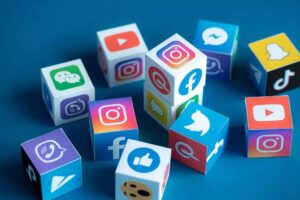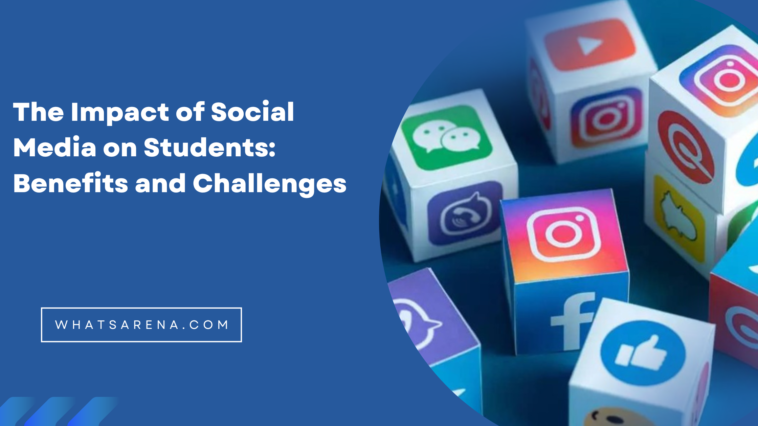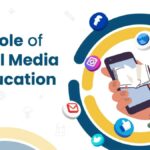Introduction
In the present old age, virtual amusement has woven itself into the surface of everyday presence, especially for students. Stages like Instagram, TikTok, Twitter, and Facebook have changed how individuals convey as well as impacted how students learn, group up, and interface socially. While these stages give different benefits, they furthermore present challenges that can out and out impact students’ insightful show and mental flourishing. This article digs into the double effect of virtual entertainment on understudies, featuring the two positive and adverse consequences, and offers procedures for tracking down a good arrangement. We”ll discuss about in this article impact of social media on students.
Positive Effects and Impact of Social Media on Students

1. Enhanced Learning Resources
One of the principal advantages of online diversion is the gigantic area of educational resources open and promptly accessible. Stages like YouTube, Coursera, and Khan Establishment offer instructive accounts and courses that take exceptional consideration of various learning styles. These resources enable students to.
Not by any stretch of the imagination like ordinary homeroom settings, online diversion grants students to stop, rewind, and return to complex places, ensuring a thorough understanding of the material. Informative substance shared through online diversion oftentimes incorporates responsibilities from experts all around the planet, extending students’ points of view and introducing them to different viewpoints. Electronic amusement stages work with pack endeavors and study gatherings, where students can share considerations and resources constantly. We”ll discuss about in this article impact of social media on students.
2. Improved Communication Skills
Online diversion stages offer students the opportunity to refine their social capacities in various ways.
Partaking in electronic discussions, conversations, and social affairs helps students with articulating their contemplations evidently and truly. Capable stages like LinkedIn engage students to interact with industry specialists, redesigning their frameworks and organization capacities and opening entrances for future occupations open entryways. Connecting with peers from different establishments propels social care and works on social capacities, preparing students for a globalized workforce. We”‘ll discuss about in this article impact of social media on students.
3. Emotional Support Networks
Virtual entertainment gives road to understudies to interface with other people who share comparative encounters and difficulties, cultivating a feeling of having a place.
Understudies can find online gatherings that take care of their inclinations, for example, emotional wellness support, scholarly help, or side interests. These people groups offer consistent reassurance and support. Virtual entertainment missions and conversations around emotional well-being can help destigmatize these issues, empowering understudies to look for help when required. Understudies frequently go to their friends via web-based entertainment for help during troublesome times, making networks that can give consolation and understanding. We”ll discuss about in this article impact of social media on students.
Negative Effects of Social Media on Students

1. Shortened Attention Span
The plan of numerous web-based entertainment stages supports fast utilization of data, which can unfavorably influence understudies’ abilities to focus.
Stages like TikTok and Instagram center around short, captivating substance, molding clients to anticipate fast rewards and making it challenging for understudies to focus on longer scholarly errands. Regular notices and the inclination to check web-based entertainment can prompt dawdling, eventually influencing scholarly execution and learning results. The steady openness to high-speed content can weaken understudies’ capacity to zero in profoundly on complex subjects or long-haul projects. We”ll discuss about in this article impact of social media on students.
2. Mental Health Concerns
The effect of web-based entertainment on psychological wellness is a developing area of worry for instructors and guardians the same.
Studies have shown that drawn-out web-based entertainment use is connected to more elevated levels of tension and misery among understudies. The strain to keep a specific internet-based persona can overpower. Stages like Instagram establish a climate where understudies frequently contrast themselves with others, prompting serious insecurities and low confidence. The organized lives displayed via virtual entertainment can cultivate sensations of rejection and detachment, especially among understudies who may pass on similar exercises. We”ll discuss about in this article impact of social media on students.
3. Cyberbullying
Cyberbullying has arisen as an inescapable issue among understudies, essentially influencing their psychological and close-to-home prosperity.
Not at all like conventional tormenting, which might happen in unambiguous areas and times, cyberbullying can occur without warning, contacting a more extensive crowd and causing consistent misery. The apparent secrecy of web-based entertainment can encourage people to take part in destructive ways of behaving without confronting quick outcomes. Survivors of cyberbullying frequently experience enduring close-to-home injury, prompting diminished scholastic execution and social withdrawal. We”ll discuss about in this article impact of social media on students.
Balancing Social Media Use

Finding a harmony between the advantages and difficulties of virtual entertainment is pivotal for understudies. Here are a few powerful procedures:
1. Set Time Limits
Laying out limits around virtual entertainment use is fundamental to guarantee that understudies keep up with centers around their scholarly obligations.
Applications like Screen Time (iOS) and Computerized Prosperity (Android) permit understudies to track and restrict their web-based entertainment use. By setting explicit time limits, understudies can focus on their investigations and disconnected exercises. Urge understudies to enjoy standard reprieves from virtual entertainment, permitting them to re-energize and zero in on different interests and obligations. We”ll discuss about in this article impact of social media on students.
2. Mindful Social Media Engagement
Advancing careful commitment can assist understudies with developing a more certain web-based insight.
Urge understudies to follow accounts that give instructive substance, motivation, or backing while at the same time unfollowing those that add to pessimism or self-question. Train understudies to fundamentally assess the data they experience via web-based entertainment, recognizing trustworthy sources and deception.
3. Encourage Offline Activities
Participating in detached practices is critical for the Impact of Social Media on Students’ mental and real prosperity.
Ask Impact of Social Media on Students to take part in extracurricular activities, similar to games, music, or academic clubs, which can help them develop new capacities and develop authentic family relationships. Pursuing relaxation exercises past electronic diversion grants students to foster interests, soothe tension, and attract their buddies in huge ways.
4. Foster Open Communication
Empowering open conversations about online entertainment use can assist understudies with exploring its difficulties.
Make places of refuge for understudies to share their web-based encounters and difficulties, advancing a culture of understanding and backing. Instruct understudies about the impacts of cyberbullying and the significance of announcing destructive ways of behaving to confided-in grown-ups or specialists.
Conclusion
The Impact of Social Media on Students and understudies is diverse, incorporating a scope of advantages and difficulties. While it gives significant instructive assets, consistent encouragement, and improved relational abilities, it additionally presents takes a chance with abbreviated capacities to focus, emotional wellness issues, and cyberbullying. By carrying out techniques, for example, setting time limits, connecting carefully with web-based entertainment, and empowering disconnected exercises, understudies can augment the beneficial outcomes of online entertainment while limiting its unfortunate results. Eventually, the objective is to engage understudies to flourish in both their computerized and certifiable conditions, guaranteeing that web-based entertainment turns into a device for development as opposed to a wellspring of stress.



